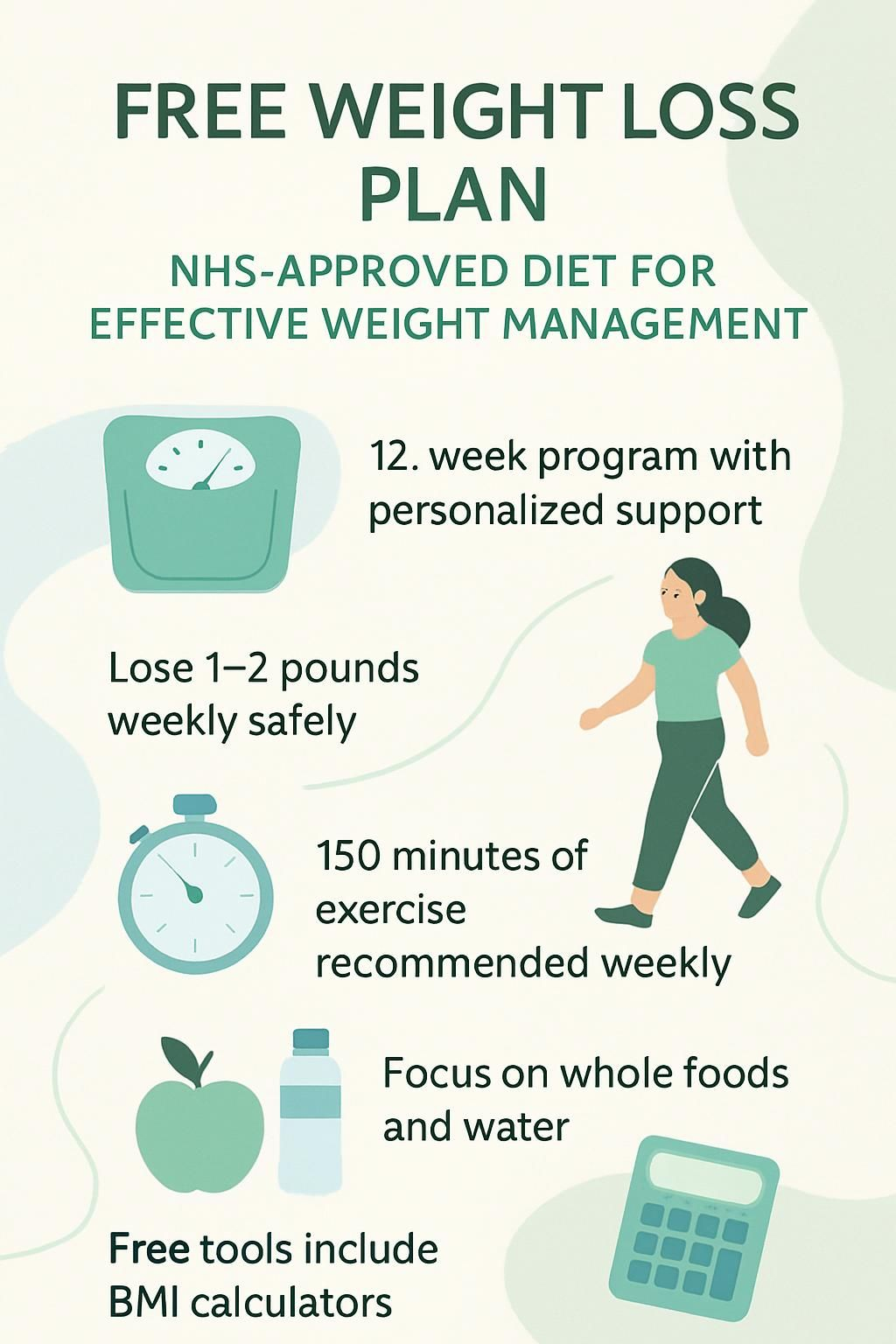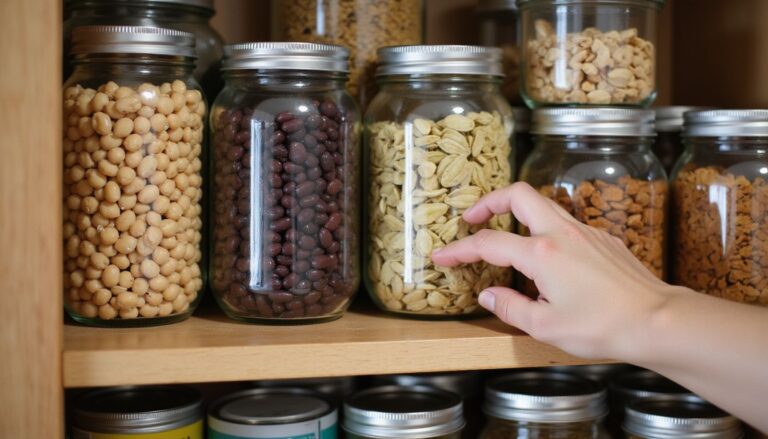Free Weight Loss Plan: NHS-Approved Diet For Effective Weight Management
Our Nutrition Assistant AI Suite will transform your body. You will lose fat, get toned, and build muscle. Gain confidence and optimal health.
Struggling to manage your weight or stick to a healthy diet? You are not alone. The free NHS weight loss plan gives you clear steps, reliable tools, and steady support to help you lose weight and keep it off.
This evidence-based diet plan makes meal planning simple, helps you track progress, and explains what to do next. In this guide, you will learn how the NHS plan works, what you get inside, and how to start without paying a penny. Small daily changes add up to long-term weight management.
Key Takeaways
- The free NHS Weight Loss Plan is a 12-week, research-based program with meal planning, calorie tracking, and weekly guidance. Most people target a safe loss of 1 to 2 pounds each week.
- Evidence supports a daily calorie deficit of about 500 to 1,000 calories for steady fat loss. The app has passed one million downloads, with the latest update in August 2025.
- Aim for at least 150 minutes of moderate activity each week, plus strength training two or three times weekly, to support long-term results.
- The plan favors whole foods like vegetables, fruits, lean protein, and whole grains. Water replaces sugary drinks to lower the risk of type 2 diabetes and high blood pressure.
- Free tools include BMI calculators, progress trackers, risk checks for conditions such as hypertension and diabetes after age 40, and privacy safeguards from the Department of Health and Social Care in London.

Why Choose an NHS-Approved Weight Loss Plan?

An NHS weight loss plan uses clear science to support healthy eating and physical activity. You get free tools like a BMI calculator, step-by-step dietary advice, and a structured 12-week schedule to help you manage your weight safely.
What scientific research supports the NHS plan?
The plan reflects decades of studies on calorie deficit, balanced diets, and regular movement. Research shows people can often lose about 5 percent of body weight in three months with a structured approach and support. Many clinical guidelines recommend reducing daily calories to create a steady deficit, then pairing that with activity for better results.
Studies show consistent calorie tracking improves the odds of reaching a healthy weight.
Weekly guides, progress check-ins, and access to a BMI calculator help you keep track over time. Losing weight can lower blood pressure, reduce heart disease risk, and improve blood sugar control. This science-first approach supports lasting weight management instead of short-term fixes.
Why is NHS guidance trusted and reliable?
NHS content follows strict quality standards and is developed by the Department of Health and Social Care, 39 Victoria Street, Westminster, London. Registered dietitians and health professionals review materials before release. The free NHS Weight Loss Plan app has been downloaded over one million times, which reflects both trust and usefulness.
Your privacy matters. The app encrypts data during transfer and does not share it with third parties. The advice follows safe nutrition practices that target one to two pounds of loss per week. I felt confident using NHS tools because they combine clear guidance with strong privacy protections.
You can access all of these resources for free through official NHS channels or local services.
How can I access NHS weight loss resources for free?
Download the NHS Weight Loss Plan app from the official NHS website or your device’s app store. You can track weight, set goals, and follow a 12-week plan built by health experts. Many local authorities in England also provide free behavioral weight management programs for people with extra weight or related conditions.
If you are 40 or older, you can get a free blood pressure check at many pharmacies in England. Football fans can join EFL Trust FIT FANS, a no-cost 12-week program that supports weight loss and fitness. Risk checks for type 2 diabetes and BMI calculators are available online without hidden fees.
What Are the Basics of Weight Management?
Weight management is about daily habits you repeat. Simple steps, practiced often, lead to steady change and better health.
Why is a calorie deficit important for weight loss?
To lose weight, you must use more calories than you eat. This gap is called a calorie deficit. The NHS plan targets a daily deficit of about 500 to 1,000 calories, which often leads to a safe loss of 1 to 2 pounds per week.
Using a reliable tracker makes this easier. The NHS app or well-known tools like MyFitnessPal help you log meals, watch portions, and reduce hidden calories. A focus on whole, less processed foods helps you feel full on fewer calories. Strength plus cardio, even in short sessions, can help maintain the deficit.
How does physical activity affect weight management?
Healthy eating creates the deficit. Regular activity helps you burn more calories and protect muscle as you lose weight. The NHS suggests at least 150 minutes of moderate exercise weekly, such as brisk walking, swimming, or cycling, plus strength training two or three days each week.
Short bouts count. Ten active minutes, repeated through the day, add up and support a healthy body weight. Many people also notice better mood and lower stress when they move more.
What are healthy eating habits to follow?
Build meals around vegetables, fruits, lean proteins, and whole grains. Choose high-fiber snacks like carrots or cucumber to stay full with fewer calories. Swap fried foods for baked or grilled options, and trade white bread for whole-grain bread.
Use a food diary in the app to spot patterns that lead to overeating. Drink water instead of sugary drinks. Weekly meal guides include options for gluten-free and vegetarian preferences so you can follow the plan without guesswork. These habits link to lower blood pressure and a lower risk of long-term disease.
Key Features of the NHS Weight Loss Plan
The NHS weight loss plan is a free 12-week program that helps you build healthy eating and lifestyle habits for steady progress, one week at a time.
What does the 12-week structured program include?
The structured program helps you lose weight at a safe pace and maintain healthy routines. Each week introduces simple tasks and tools that build on the week before.
- Start each week with a guide on calorie deficit, portion control, meal planning, movement, sleep, and stress.
- Set goals in the app so your plan fits your needs and daily rhythm.
- Use the daily food and calorie diary to log meals and find areas to improve.
- Weigh in weekly to track progress. Accountability supports long-term change.
- Follow your daily calorie target, set using your age, height, weight, sex, health conditions, and activity level.
- Plan balanced meals using NHS recipes. Focus on whole foods and limit sugary and high-fat items.
- Increase movement with the app’s exercise tips. Add steps and include strength days.
- Use built-in tools like the BMI calculator and calorie tracker, free of charge.
- Find referral links for nutrition support groups as needed, including community options like EFL Trust FIT FANS.
- Get tips to handle setbacks, such as improving sleep or easing stress.
Each step reflects national guidance and aims for lifelong changes instead of quick fixes.
How can I track my progress effectively?
Use the NHS Weight Loss Plan app to log your food, drinks, and daily steps. Enter meals to see your calorie total. Log your weight weekly to spot trends and adjust if needed. The in-app BMI calculator gives instant feedback on your body mass index.
Clear graphs and reminders keep you focused. Set targets that match your life and energy level. Seeing small wins on charts can boost motivation during busy or stressful times. These routines help you build habits that last, with or without medicines like semaglutide.
What practical dietary advice does the plan offer?
Practical tips make healthy eating automatic. Start with small changes you can repeat, then build more as you gain confidence.
- Choose water instead of sugary drinks to cut empty calories and improve hydration.
- Use sample meal plans, for example oatmeal with berries and nuts, to set a simple morning routine.
- Base meals on vegetables, fruits, whole grains, lean proteins, and healthy fats, not packaged snacks.
- Limit high-fat and high-sugar foods. Use app food swaps to find better choices.
- Try easy recipes like veggie curries or bean soups to add fiber and flavor.
- Follow a two-week starter plan with grocery lists to reduce stress on busy days.
- Set a personal calorie target in the app to create a steady deficit.
- Make one or two small changes each week. Slow change sticks better than all-or-nothing plans.
- Use shop-smart tips to build a healthy cart at the store or while eating out.
- Practice strategies for cravings and emotional eating so you can stay on track.
These steps help you stay consistent and support both physical and mental health.
How does the plan support sustainable lifestyle changes?
The plan builds change through small, repeatable habits. Each week focuses on a few doable actions such as planning one more home-cooked meal or adding a short walk after lunch. The app offers reminders and positive nudges so you do not lose momentum.
As your routines improve, you learn why each habit matters. You also learn how to manage stress and sleep, two pillars that affect your appetite and energy. A short note from me, tracking my dinners and steps kept me steady during a tough month at work.
What Are the Benefits of the NHS Weight Loss Plan?
This plan blends evidence, simple tools, and coaching-style tips. It helps you move from intention to daily action.
How does the plan promote long-term weight management?
You build lasting skills over 12 weeks, then keep using them. Weekly structure teaches you how to plan meals, track intake, and fit in activity. Compounded over time, these habits protect your progress.
The app’s trackers help you spot patterns early, which prevents small slips from turning into bigger setbacks. You can customize goals to fit busy seasons. Many people find diverse meal options make the plan feel flexible, not restrictive.
In what ways does it improve overall health and well-being?
Better nutrition and regular movement affect more than weight. High-fiber foods support digestion and gut health. Choosing water improves hydration, which can help energy and focus.
A balanced diet with vegetables, fruits, lean protein, and whole grains supports healthy cholesterol and blood pressure. Movement helps lower harmful belly fat. Stress tools like breathing, yoga, or short walks can lift mood, and seven hours of sleep or more helps with appetite control.
How does it reduce the risk of chronic diseases?
Even modest weight loss can reduce the risk of type 2 diabetes, high blood pressure, and heart disease. It can also improve blood sugar control and reduce strain on your heart. The NHS plan supports the path to a healthier body weight with daily actions you can measure.
If you are 40 or older, the NHS recommends free blood pressure checks at participating pharmacies. Online type 2 diabetes risk tools make it easy to see your risk based on age, family history, body shape, and ethnicity.
How does it encourage healthier lifestyle choices?
The app suggests small weekly steps, such as swapping one sugary drink for water or adding a serving of vegetables at lunch. Short walks fit into busy days and help you build an activity streak. Tips on alcohol calories help reduce hidden intake.
Group programs like EFL Trust FIT FANS offer a friendly push through peer support. The plan builds confidence through steady wins, not strict rules.
How Do I Get Started with the NHS Weight Loss Plan?
Getting started is simple. Download the app, set goals, then follow the first week’s guide.
How do I download the NHS Weight Loss Plan app?
Find the NHS Weight Loss Plan app in your device’s app store under Health and Fitness. Search for “NHS Weight Loss Plan.” The developer is the Department of Health and Social Care, 39 Victoria Street, Westminster, London SW1H 0EU, UK, support at +44 7951 332332 or digitalproducts@dhsc.gov.uk.
The current version was updated on August 26, 2025, and has surpassed one million downloads. Data is encrypted during transfer and is not shared with third parties. Some information may not be deletable to protect your safety under privacy rules. The program is free to install, with no hidden costs.
How can I set realistic weight loss goals?
Use the app’s free assessment to set a personal calorie target. Gradual loss works best. Many people aim to lose about 5 percent of body weight in three months. That pace supports health and makes maintenance easier.
Track weekly and set milestones like 1 to 2 pounds per week. Celebrate progress with non-food rewards like new walking shoes or a playlist. This keeps motivation high without adding extra calories.
How do I assess my current eating habits?
Start by logging your meals in the app’s food and calorie diary for a full week. The Diet Score feedback tool highlights patterns, such as low fiber or frequent sugary foods. Weekly guides suggest practical swaps you can try right away.
Education sections explain how choices affect hunger, energy, and weight. This insight shapes a custom action plan that fits your routines and preferences.
How do I create a personalized action plan?
A simple plan keeps you moving forward. Use the app to set clear, doable steps and to track them daily.
- Complete the free assessment so the app can match your needs and preferences.
- Pick from expert meal styles if available, such as Gluten-Free, Simple, Higher Protein, Mediterranean, Vegetarian, or heart-friendly options.
- Set realistic goals for weight and healthy eating. Adjust as you learn what works.
- Log meals, water, activity, and weight to get feedback you can act on.
- Schedule reminders for meals and movement so busy days do not derail you.
- Use group coaching or speak with a registered dietitian if you want extra support.
- Review progress weekly and update your next steps based on results.
- Focus on one or two changes per week, such as adding vegetables or choosing water over soda.
What Are Healthy Eating Recommendations?
The NHS plan guides you to eat more whole foods and fewer ultra-processed items. This helps you hit your calorie target without feeling deprived.
Why focus on whole, unprocessed foods?
Whole foods pack more nutrients and fiber per calorie, which helps you stay full longer. Vegetables, fruits, whole grains, and lean proteins support a steady calorie deficit and better digestion. This approach also steers you away from quick-fix diets that can backfire.
Research links diets rich in whole foods with a lower risk of heart disease and type 2 diabetes. Making these swaps improves health while keeping meals satisfying.
How can I limit sugary and high-fat foods?
Swap sugary drinks for water or unsweetened tea. Choose fruit instead of dessert, and whole-grain snacks instead of cookies or chips. Use the daily diary to spot patterns and find where high-fat foods creep in.
Cut back step by step. For instance, reduce soda to a few days per week, then switch to water. Keep an eye on alcohol calories. Fill plates with lean protein and vegetables, which naturally crowds out less healthy choices.
What fruits, vegetables, and proteins should I include?
Colorful produce and lean proteins form the base of balanced meals. Rotate options to keep meals interesting and to cover more nutrients.
- Eat a variety of fruits such as apples, berries, oranges, and pears for vitamins and fiber.
- Choose high-fiber vegetables like carrots, spinach, broccoli, tomatoes, and bell peppers.
- Pick lean proteins, including chicken breast, fish like salmon or tuna, tofu, and legumes such as beans or lentils.
- Add heart-friendly foods like leafy greens, tomatoes, and red peppers to salads and stir-fries.
- Try Mediterranean-style plates with beans, chickpeas, vegetables, and fish in place of red meat.
- Make oatmeal with berries and a small handful of nuts for a quick, filling breakfast.
- For lunch or dinner, build a big salad with greens, grilled chicken or baked fish, and mixed vegetables.
- Alternate animal protein with plant protein to keep costs and variety in balance.
- Choose water every time you are thirsty to avoid extra calories.
Eating more vegetables helped me feel full without feeling weighed down, which made the plan easier to follow.
Why choose water over sugary drinks?
Water has zero calories. A single can of soda can add about 140 calories and more than 30 grams of sugar. Cutting sugary drinks reduces your daily intake and lowers your risk of obesity, type 2 diabetes, and heart disease.
The app can send reminders to help you pick water over sweetened coffees, juices, or energy drinks. Swapping one sugary drink per day for water can trim roughly 980 calories per week. Track alcohol too, since drinks can hide many calories.
How Does Physical Activity Support Weight Loss?
Activity is a force multiplier. It helps you burn more calories, keep muscle, and feel better day to day.
Why aim for at least 150 minutes of exercise weekly?
The NHS recommends at least 150 minutes of moderate activity each week. Brisk walking, swimming, or cycling fit the bill and are easy to scale. This level of movement helps you reach a calorie deficit and maintain weight loss over time.
Regular activity also lowers the risk of heart disease and type 2 diabetes. Tracking minutes in the app can make the target feel more tangible and rewarding.
How often should I do strength training exercises?
Do strength training 2 to 3 times per week. This helps maintain muscle, supports your metabolism, and improves body composition while losing weight. The app can remind you to include these sessions.
Simple moves like squats, lunges, push-ups, and resistance band work count. Safe form matters, so follow guidance in the app or ask a professional if you are unsure.
What simple activities can keep me active daily?
Short bursts of movement add up quickly. Choose easy actions that fit your day and repeat them often.
- Walk briskly for 10 minutes at a time, outdoors or indoors.
- Use stairs instead of elevators to build leg strength and endurance.
- Track your steps in the app to stay motivated and accountable.
- Do chores like vacuuming, sweeping, or yard work to raise activity without gym time.
- Stand during phone calls to cut sitting time and boost energy use.
- Park farther away to add extra steps.
- Schedule short activity breaks across the day, even 10 minutes helps.
- Join EFL Trust FIT FANS or other community programs for support and ideas.
What Additional Support and Resources Are Available?
Free digital tools and local services can make your plan easier to follow. Combine the app with community support to boost accountability.
How do BMI calculators and calorie tracking tools help?
A BMI calculator estimates whether your weight is in a healthy range for your height. The NHS app includes one, so you get quick feedback and can set realistic targets. It is only a screening tool, so discuss concerns with your clinician if needed.
Calorie tracking tools help you monitor intake with less guesswork. The NHS app offers a daily diary and personal targets. Popular apps like MyFitnessPal or LoseIt can also scan barcodes and track meals in seconds. Seeing the numbers each day supports better choices.
What local weight management services can I use?
Many local authorities in England offer free behavioral weight management programs if you meet their criteria. The NHS Digital Weight Management Programme supports adults with conditions such as type 2 diabetes and high blood pressure. Qualifying users can access the service at no cost.
Community options like EFL Trust FIT FANS run 12-week group programs. Free blood pressure checks at pharmacies are available for people aged 40 and over. Organizations such as Obesity UK provide extra resources and signposting.
What is the NHS Digital Weight Management Program?
This online service supports people with obesity-related health conditions. If you qualify through an NHS referral, you can access digital tools, structured lessons, and progress tracking at home. The program focuses on safe weight loss, healthy habits, and clear milestones.
It reflects the NHS commitment to accessible, evidence-led care. People who need extra structure often benefit from the flexibility of digital support.
How do community programs like EFL Trust FIT FANS support weight loss?
EFL Trust FIT FANS is a free 12-week program for football fans who want to lose weight. Sessions happen locally and include group activity, practical education, and peer support. The group setting adds accountability and keeps the process enjoyable.
Progress is shared in a supportive setting, which helps people stay engaged. This real-world support aligns well with the digital NHS app, giving you the best of both worlds.
What Are Common Challenges and How Can I Overcome Them?
Weight loss takes patience. A few simple strategies can help you stay on track even during tough weeks.
How can I stay motivated over time?
Set small weekly goals you can meet, such as one extra walk or one planned lunch. Use app reminders and weekly guides for new tips. Track progress so you can see the proof that your work is paying off.
Celebrate small wins with non-food rewards. Join community groups like FIT FANS for support. Reading stories from others can help when motivation dips. If you feel stuck, a session with a registered dietitian can reset your plan.
What strategies help manage cravings and emotional eating?
Cravings happen. The goal is to prepare for them and respond with a plan instead of willpower alone.
- Keep high-fiber, low-calorie snacks ready, such as carrot sticks or cucumber.
- Log cravings and triggers in the app to spot patterns and plan counters.
- Use stress tools like deep breathing, yoga, or a short walk before you eat.
- Swap higher-calorie foods for lighter options, like Greek yogurt in place of cream.
- Eat regular meals. Skipping meals can make cravings much stronger later.
- Seek support from forums, local groups, or a counselor if cravings feel overwhelming.
- Practice mindful eating. Pause, rate your hunger, then decide.
- Plan for setbacks, set realistic goals, and reward progress with non-food treats.
How do I balance weight loss with a busy lifestyle?
Use the app’s meal planning to prep quick, healthy meals. Log meals and movement on the go to stay aware. Make simple swaps, like fruit instead of sweets or water instead of soda.
Fit in micro-workouts, such as a 10-minute walk or bodyweight set between meetings. Group coaching and forums can boost accountability when time is tight. These small habits fit around family, school, or work and still support results.
Frequently Asked Questions
Here are quick answers to common questions about the NHS weight loss plan.
How much weight can I lose on the NHS plan?
Many people lose about 5 percent of their body weight in three months when they follow the plan closely. Some reach up to 13 percent in six months with consistent effort. For example, if you weigh 200 pounds, 5 percent is about 10 pounds in 12 weeks.
Results vary based on starting weight, age, activity level, and consistency. The NHS promotes gradual, steady loss for better health and maintenance.
Is the plan suitable for everyone?
The plan can fit many lifestyles and dietary needs. If you have a medical condition, take medicines, are pregnant, or are a teen, speak with a healthcare professional before starting. Some targets may need adjustments for safety.
Mental health affects motivation and routines. If now is not the right time, you can start when ready. Free services like the NHS Digital Weight Management Programme can offer extra support if you qualify.
Can I combine the plan with weight-loss medications?
Yes, some people use this plan alongside approved weight-loss medicines, including GLP-1 drugs. There is a special 24-week pathway for people on these treatments. Talk with your healthcare professional first so they can monitor progress and guide changes as needed.
Are there any hidden costs?
The NHS plan and its app are free. There are no download fees, subscriptions, or paywalls. You might choose to buy certain foods or fitness gear, but those are optional. Many people do well using only the app and free NHS guidance.
Conclusion
The NHS weight loss plan gives you a clear path, simple tools, and weekly steps that work in real life. With a structured diet plan, daily tracking, and reliable guidance, you can move toward your healthy weight at a safe pace.
Start small and stay consistent. Use the app to plan meals, track calories, keep an eye on your BMI, and build movement into your day. If you have a medical condition or take medication, speak with a healthcare professional before making major changes. Your next step can be as simple as one healthy swap and a 10-minute walk today.
FAQs
1. What is the NHS-approved diet for effective weight management?
The NHS-approved diet focuses on balanced meals with controlled portions, regular physical activity, and healthy food choices. It uses evidence from clinical studies to support its guidelines.
2. How does a free weight loss plan help manage body weight?
A free weight loss plan offers structured meal ideas and exercise tips based on scientific research. These plans guide users in making healthier decisions that lead to gradual and lasting results.
3. Are there any statistics showing the effectiveness of this approach?
Clinical data show that people following an NHS-backed eating pattern can lose about 5 to 10 percent of their starting body mass within six months when combined with increased movement and lower calorie intake (NHS Digital, 2020).
4. Can anyone follow this type of program safely?
Most adults can use an NHS-approved diet without risk if they do not have specific medical conditions like diabetes or heart disease; those individuals should consult a healthcare provider first for tailored advice.
Summary:
The NHS-endorsed eating plan relies on proven methods such as portion control, nutritious foods, and steady activity levels. Research supports its safety and success for most adults seeking better health through sustainable changes rather than quick fixes.







